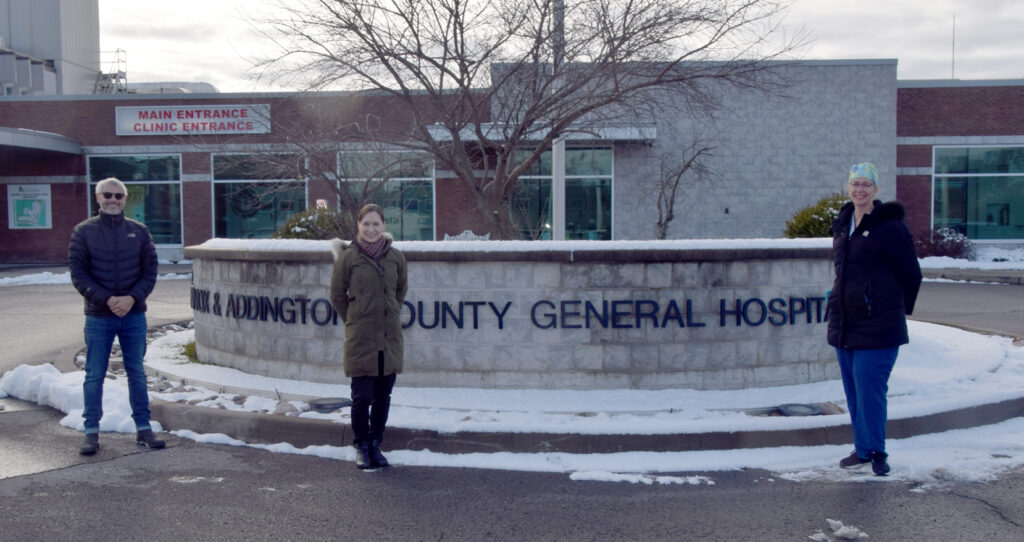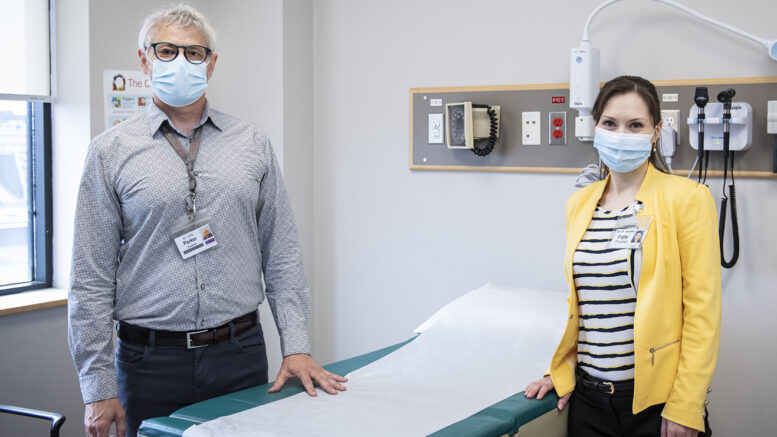Adam Prudhomme
Editor
Patients in the Napanee area with suspected lung cancer now have access to faster diagnosis thanks to a new Lung Diagnostic Assessment Program (LDAP) located within Lennox and Addington County General Hospital.
Launched late last month, the rapid assessment clinic is a satellite operation of Kingston Health Sciences Centres (KHSC) and represents a new innovation in diagnosing lung cancer in that it aims to serve patients living in rural areas. The initiative to de-centralize the diagnostic process was led by Dr. Geneviève Digby, respirologist and clinical lead for the Diagnostic Assessment Programs at KHSC and Dr. Christopher Parker, respirologist and LDAP physician.
“This initiative was born out of a recognition that lung cancer was one of the most serious threats in Canada,” said Parker. “Work that has been led by Dr. Digby in Kingston has identified that there’s lots of barriers for people who are trying to seek help for their lung cancer. This can mean all along the pathway from their initial visit where the diagnosis is made, to going to through with the visits that involve treatment. This clinic was really born out of that research that told us we have a way to provide care closer to people’s homes and we recognize that we serve a large regional community and that we can hopefully break down some barriers and allow people access timely care for lung cancer.”
Digby’s research into barriers that often lead rural patients to be diagnosed with late stage lung cancer as opposed to earlier intervention earned her first place in Merck Canada’s Lung Cancer Innovation Challenge. The challenge sought to find solutions to reduce the length of time between diagnosis and treatment, and enable improved health outcomes, especially for priority patient groups, such as rural and lower socioeconomic populations. KHSC won first-place in the competition with their idea to launch a rapid assessment clinic for patients with suspected lung cancer in LACGH.
“We coordinate care for patients from the first thought that they might have lung cancer through to diagnosis and transfer of care to appropriate specialists who treat lung cancer, whether it be surgeons of oncologists,” said Digby. “We help to coordinate that care during what can be a very anxiety provoking time and very overwhelming period of time to help navigate patients through this diagnostic journey for lung cancer.”
Early detection is key in any fight against cancer, but particularly in lung cancer.

Kingston Health Sciences Centre’s Dr. Christopher Parker and Dr. Geneviève Digby will work alongside LACGH’s manager of respiratory services Dr. Annette Stuart. Photo by Adam Prudhomme.
“Lung cancer is the leading cause of cancer related death in Canada,” said Digby. “It’s because it’s an aggressive type of cancer and because unfortunately due to the nature of the disease, many patients present with late or advanced lung cancer where treatments are maybe not as effective if we had caught it earlier. It leads to a high symptom burden for patients and affects how long people have to live and the more we can help patients through it as early as possible and as quickly as possible, the better outcomes they have.”
Parker noted there was several factors they found that led to a higher mortality rate among those living in rural regions.
“We found everything from the cost of having to travel to Kingston to the uncertainty of having to leave home and go to another city for treatment, the unfamiliarity of that, the fact that their care givers have to take time of work in order to take someone for multiple visits out of town,” said Parker. “All of these are the features that came out of this research.”
Parker says a major mandate of the LDAP is to reach the Indigenous community.
“We were very fortunate to be supported by leaders of the Indigenous community recognizing that lung cancer remains a major health concern within that community,” he added. “We are hoping to engage not just the Indigenous patients but right down from Indigenous leadership to try to get the word out to this community in and around the Napanee area and really try to serve that population.”
Winning the Lung Cancer Innovation Challenge allowed the doctors to develop the Napanee clinic from the group up into something that will best suit the demographic.
“We would like to use this particular clinic in Napanee as an opportunity to show just how much an outreach clinic like this can have impact on the community and find the best ways to integrate it so that patients really get the maximum value from it,” said Digby. “What we learn from the outreach clinic we hope to apply to other rural regions in our community, we hope to have other regions in Ontario learn from it and be able to implement something similar for them. We really see it as something that can be spread and sustained across the province.”
Their partnership with LACGH allows them access to some of their cutting edge diagnostic testing facilities.
“This is one of those first attempts to really take that model to the patients in the community and I think it’s also the first one to bring in the voice of the Indigenous population from the region where we’re hoping to integrate an Indigenous lead into our program to really best meet the needs of our Indigenous patients and remove any barriers there that they might specifically experience in regards to lung cancer,” said Digby.

